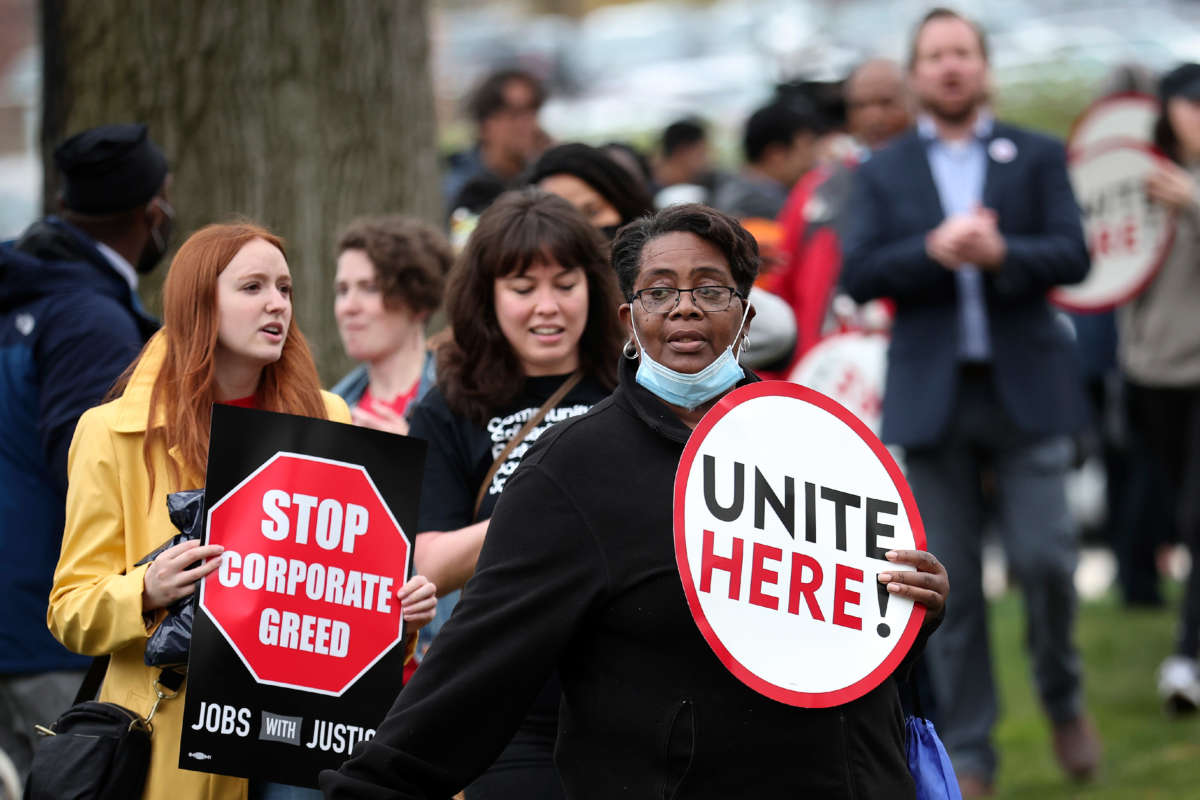Truthout is a vital news source and a living history of political struggle. If you think our work is valuable, support us with a donation of any size.
A top tactic that employers use to feed workers anti-union propaganda and threats could soon be outlawed, as the National Labor Relations Board’s (NLRB) top legal counsel has released a new memo arguing for a return to a previous version of federal labor laws.
NLRB General Counsel Jennifer Abruzzo wrote in a memo released on Thursday that captive audience meetings “inherently involve an unlawful threat” against employees. She argued that the board should consider captive audience meetings — which she defined as also including coerced one-on-one meetings with managers — illegal under the National Labor Relations Act.
Abruzzo explained in the memo that captive anti-union meetings were once considered unlawful under federal labor laws, but are now perfectly legal. As a result, they are an incredibly common union-busting practice, and have been employed against recent organizing efforts by workers at Amazon, Starbucks, and more.
If the NLRB does declare captive anti-union meetings illegal, it would be a major boon for union organizers. Such meetings are incredibly effective at intimidating employees against supporting union efforts; a 2009 study by the Economic Policy Institute (EPI) using data from 1999 to 2003 found that when employers used captive audience meetings in anti-union campaigns, the union won their election only 47 percent of the time. When employers didn’t use them, that rate jumped to 73 percent.
Abruzzo said that any interpretation of the law which allows such meetings to take place is plainly wrong. Employers are exercising undue power over employees when they force them to attend meetings limiting their choices and actions in the workplace, she wrote.
This reasoning can apply to a wide range of meetings, she went on, adding that even when managers aren’t outright telling workers not to unionize, captive meetings can contain “threat[s] that employees will reasonably perceive even if it is not stated explicitly.”
“This license to coerce is an anomaly in labor law, inconsistent with the Act’s protection of employees’ free choice. It is based on a fundamental misunderstanding of employers’ speech rights,” Abruzzo said in a statement.
“I believe that the NLRB case precedent, which has tolerated such meetings, is at odds with fundamental labor-law principles, our statutory language, and our Congressional mandate,” she continued. “Because of this, I plan to urge the Board to reconsider such precedent and find mandatory meetings of this sort unlawful.”
Labor unions expressed support for Abruzzo’s memo. “The question of whether workers want a union should be the workers’ choice — not the employers’ — free of intimidation and interference. Captive audience meetings make that impossible,” said Stuart Appelbaum, the president of the Retail, Wholesale and Department Store Union.
While outlawing captive audience meetings could remove a large obstacle for many union organizers, it still may not be enough to equalize labor laws between employers and unions. A 2019 report from EPI found that 41.5 percent of employers were charged with unlawful actions during union campaigns, including moves like firing, harassing and surveilling workers.
Many employers purposely break the law in waging anti-union campaigns because punishments for labor law violations are incredibly lax and usually only amount to a slap on the wrist, especially for large companies.
Abruzzo hopes to level the playing field by addressing that, too. Though it’s up to Congress to pass sweeping labor law reforms, Abruzzo wants the labor board to reinstate the use of the Joy Silk doctrine, which would make it far easier for workers to unionize.
Under Joy Silk, employers would have to present legitimate reasons for not recognizing a union’s majority status among employees — meaning that employers would rarely be able to reject union recognition as long as most workers say they want a union.
Currently, employers are able to refuse to voluntarily recognize a union, forcing workers to undergo a union election. This buys employers time to hold captive meetings and otherwise discourage workers from unionizing.
A terrifying moment. We appeal for your support.
In the last weeks, we have witnessed an authoritarian assault on communities in Minnesota and across the nation.
The need for truthful, grassroots reporting is urgent at this cataclysmic historical moment. Yet, Trump-aligned billionaires and other allies have taken over many legacy media outlets — the culmination of a decades-long campaign to place control of the narrative into the hands of the political right.
We refuse to let Trump’s blatant propaganda machine go unchecked. Untethered to corporate ownership or advertisers, Truthout remains fearless in our reporting and our determination to use journalism as a tool for justice.
But we need your help just to fund our basic expenses. Over 80 percent of Truthout’s funding comes from small individual donations from our community of readers, and over a third of our total budget is supported by recurring monthly donors.
Truthout’s fundraiser ended last night, and we fell just short of our goal. But your support still matters immensely. Whether you can make a small monthly donation or a larger one-time gift, Truthout only works with your help.
